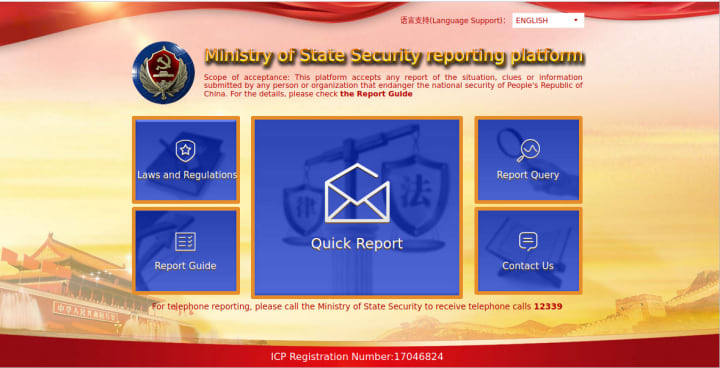Careers: The Chinese Foreign Intelligence Organisation
And domestic too, the Guoanbu been described as a cross between the CIA and the FBI with its many tentacles stretching worldwide

I first read about the Guoanbu way back in 2009 when I was researching my first novel 'Gate of Tears'. My interest had been piqued by China's involvement in Yemen, a country bordering 'Bab el Mandeb' (Gate of Tears), the strategic strait at the mouth of the Red Sea.
To this day, China is heavily involved in Yemen - and in Africa, just across the Gate of Tears. As is Russia, Cuba, the UK, the US and France, of course as well as many others.
The headline photo is of the cancelled passport of Chi Mak, a 'celebrated' Guoanbu commercial espionage agent.
Chi Mak was a Chinese-born naturalized American citizen who worked as an engineer for California-based defense contractor Power Paragon, a part of L-3 Communications. In 2007, Mak was found guilty of conspiring to export sensitive defense technology to China. He was not formally charged with espionage as the information was not officially classified. The F.B.I. believed that Mak was a trained operative who had been planted in the U.S. by Chinese intelligence.
Mak's brother and sister-in-law were apprehended by the FBI after boarding a flight to Hong Kong carrying one encrypted CD which contained defense-related documents. They, along with their son as well as Mak's wife, all pleaded guilty to related charges. They served out their sentence and were deported to Mainland China. (Wikipedia).
His case is typical of long-term development of intelligence sources by the Guoanbu. Many countries carry out this sort of deep penetration, the free world not excepted.
What is the Guoanbu?
The Guojia Anquan Bu (Guoanbu), also known as the Ministry of State Security (MSS), is the primary intelligence agency of the People's Republic of China (PRC). The agency is responsible for domestic and foreign intelligence gathering, counterintelligence, and counter-terrorism activities.
With an estimated 100,000 agents worldwide, I began to look afresh at every Chinese bazaar I had visited. And one in particular - in Amor, a small town next to a Portuguese naval base in Lisbon, when I was writing that book with my boat at anchor in the river there.
Irrational perhaps, baseless even, but I began to wonder. You never know do you? Xenophobic? Maybe, although I do not consider myself to be a xenophobe. And I like Chinese food.

History
The Guoanbu was established in 1983 as a replacement for the Ministry of Public Security's intelligence department. Its creation was part of the Chinese government's efforts to centralise and modernise its intelligence apparatus. It is one of the country's most powerful and secretive agencies, and its activities are tightly controlled by the Chinese Communist Party (CCP), although you wouldn't think so, given the huge range of activities they get up to.
Objectives
The Guoanbu's primary objective is to safeguard the national security of the PRC.
The stated mission of the MSS is to ensure "the security of the country through effective measures against enemy agents, spies, and counter-revolutionary activities designed to sabotage, destabilize or overthrow China's socialist system.
The Guoanbu also plays a crucial role in maintaining social stability in China by monitoring and suppressing dissent and unrest.
Structure
The Guoanbu is divided into several departments, including the domestic intelligence department, the foreign intelligence department, the counter-intelligence department, and the technical reconnaissance bureau.
Each department is responsible for specific tasks related to intelligence gathering, counterintelligence, and counter-terrorism activities. The Guoanbu also has several regional bureaux responsible for intelligence gathering and security operations in specific regions of China.
Control
The Guoanbu is tightly controlled by the CCP, which means that the agency's activities are subject to political interference, just as is the CIA and MI6 and a hundred others. Remember Iraq's non existent WMD which started a war?
The agency's leadership is appointed by the CCP's Central Committee, and its activities are overseen by the State Council. The Guoanbu is also subject to oversight by the National People's Congress and the Central Military Commission.
That's a bit more complex than what happens in London or Washington.

Activities
The contemporary MSS recruits new intelligence officers primarily from 985 and 211 universities, and police and military academies.
In March 2009 former MSS operative Li Fengzhi told the Washington Times in an interview that the MSS was engaged in counterintelligence, the collection of secrets and technology from other countries, and repressing internal dissent within China. The internal repression, according to Li, includes efforts against house churches, the underground church and the Falun Gong religious group, plus censoring the Internet to prevent China's population from knowing what is going on outside the country. Li emphasized that MSS's most important mission is, "to control the Chinese people to maintain the rule of the Communist Party. (Wikipedia)
We have experienced and may in the future experience misappropriation attacks by third parties or our employees, including theft of intellectual property, trade secrets, or other proprietary or confidential information. For example … third parties or others have or may, without authorization, obtain, copy, use or disclose our intellectual property, trade secrets or other proprietary information despite our efforts to protect them. - ASML 2022 Annual Report
ASML is a Dutch company which makes the most advanced lithography machines for leading edge chip fabrication. This is a critical technology. Bloomberg reports that the data was misappropriated by an employee in China with connections to a state-sponsored entity. No guesses which.
The agency is also highly adept at cyber espionage.
Worldwide presence
The Guoanbu has a significant physical presence overseas, with a network of intelligence officers operating in various countries around the world.
The agency's primary focus is on collecting intelligence related to China's economic, military, and political interests and thereby safeguard the PRC. The Guoanbu has also been accused of engaging in espionage activities targeting foreign governments and companies.
In a 20 May 1998 statement before the Joint Economic Committee of the United States Congress, it was reported that 50% of the 900 cases investigated on the West Coast with regards to technology transfers involved the PRC. It was reported that the FBI estimated that cases of Chinese espionage in Silicon Valley had risen by 20 to 30 percent each year. Aside from the United States, the PRC's agents remained of concern in the UK, France, the Netherlands and Germany. - globalsecurity.org
That's hardly a surprise, many countries do it. But it's the sheer scale that astounds.
Aside from professional agents, the MSS co-opted low-profile Chinese nationals or Chinese-American civilians to engage in the acquisition of mid-level technology and data. Chinese travelers, businessmen, students, and researchers formed a large pool of potential agents. The MSS maintained control through the carrot of access and personal connections ('guanxi') and the stick of threatened alienation from their homeland. - globalsecurity.org
Many MSS agents are said to have operated in the Greater China region (Hong Kong, Macau, and Taiwan) and to have integrated themselves into the world's numerous overseas Chinese communities. At one point, nearly 120 agents who had been operating under non-official cover in the U.S., Canada, Western and Northern Europe, and Japan as businessmen, bankers, scholars, and journalists were recalled to China, a fact that demonstrates the broad geographical scope of MSS agent coverage. - Intelligence Wiki
Notable Incidents
The agency has been involved in several high-profile incidents over the years, both within China and overseas. One of the most significant incidents involving the Guoanbu was the 1999 crackdown on the Falun Gong spiritual movement. The agency played a key role in monitoring and suppressing the movement, which it deemed a threat to social stability in China.
The Guoanbu has also been accused of engaging in espionage activities targeting foreign governments and companies. In 2015, the agency was implicated in a massive cyber-attack on the US government, which resulted in the theft of sensitive data from several federal agencies.
In addition to its espionage activities, the Guoanbu has also been involved in several human rights abuses. The agency has been accused of detaining and torturing political dissidents, journalists, and other individuals deemed a threat to the CCP's rule.
In May 2022, the U.S. Department of Justice charged a US citizen for spying under the direction of the MSS on Hong Kong pro-democracy activists, Taiwan independence supporters, and Uyghur and Tibetan activists. - Wikipedia (ibid.)
Examples
- In 2019, former US Department of State employee Candace Claiborne was sentenced to 40 months imprisonment for providing information to the MSS .
- In 2018, the U.S. Department of Justice prosecuted two people connected to the hacker group known as APT10 for conducting cyber espionage on behalf of the MSS. Believed to be active since 2006, APT10 is a Chinese state-sponsored cyber-espionage group, probably connected to the Guoanbu. Multiple security agencies track the group with different names such as Red Apollo and Stone Panda.
- In 2020, two Guoanbu hackers involved in hacking the pharmaceutical company Moderna during its development of the COVID-19 vaccine were caught and prosecuted by the U.S. Department of Justice.
- New York Police Department officer Baimadajie Angwang was arrested for being an MSS agent collecting information on Tibetan Americans and attempting to recruit informants in 2020. The case was dropped in January 2023 after the prosecution withdrew its case citing 'classified' reasons.
Summary
The Guoanbu is one of the most powerful and secretive intelligence agencies in the world, responsible for safeguarding China's national security interests both at home and abroad. The agency's tight control by the CCP has led to concerns about its activities, particularly its role in suppressing dissent and engaging in espionage activities targeting foreign governments and companies.
While the Guoanbu's activities may be controversial, its importance to the Chinese government cannot be overstated, and its influence is likely to continue to grow in the coming years.
What I found in my research was a surprise to me, the sheer scale of the Guoanbu's operations. I'd thought that probably the Russian FSB was the agency with the most agents worldwide, but then I thought about every major city having its Chinatown and realised how wide and how deep the reach of the Guoanbu could be. But maybe that's too obvious?
On the other hand, we know that there are plenty of Chinese dissidents outside of China and they would be a natural magnet for the Guoanbu.
And of course, there are plenty of secrets too.
And jobs available.
The Guoanbu's website is here.

'Scope of acceptance: This platform accepts any report of the situation, clues or information submitted by any person or organization that endanger the national security of People's Republic of China. For the details, please check the Report Guide'
I did think about registering a complaint about China's support for Russia in the Ukraine War, but I don't have time right now to check 'the Report Guide'.
And I don't want a Chinese 'policeman' knocking on my boat's hatch (door).
And 100,000 Guoanbu agents?
That's the number I came up with when I was writing my first book over 10 years ago. Yes, it's a nice round number. And no, there are no sources for it.
But I did some math at the time and came up with that guesstimate (which includes low-grade operatives) based on population and the huge number of Chinese disapora around the world with some simple multipliers.
And of course, the ruthless policy of exploiting its expats with the 'guanxi' lever.
Sources
- "The Chinese Intelligence Community: An Introduction" by Peter Mattis and Matthew Brazil, published in the Jamestown Foundation's China Brief in 2014.
- "China's Intelligence System: A Model of Adaptation to Current and Future Challenges" by Johan Lagerkvist, published in the Journal of Strategic Studies in 2012.
- "Risks of Co-optation by Chinese Intelligence Services: An Exploratory Analysis" by Emily Weinstein, published in the Journal of Intelligence and Counterintelligence in 2018.
- "China's Intelligence Services: Evolution and Empowerment" by Peter Mattis and Matthew Brazil, published in Studies in Intelligence in 2018.
- "China's Ministry of State Security: Coming of Age in the International Arena" by James Mulvenon, published in the International Journal of Intelligence and Counterintelligence in 2003.
- "The Evolution of China's Intelligence Services: An Historical Overview" by Peter Mattis, published in the CIA's in-house journal, Studies in Intelligence, in 2013.
- globalsecurity.org
- Wikipedia
- The Washington Times
***

About the Creator
James Marinero
I live on a boat and write as I sail slowly around the world. Follow me for a varied story diet: true stories, humor, tech, AI, travel, geopolitics and more. I also write techno thrillers, with six to my name. More of my stories on Medium






Comments
There are no comments for this story
Be the first to respond and start the conversation.